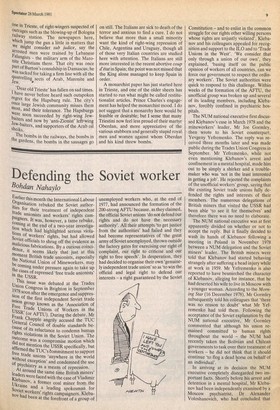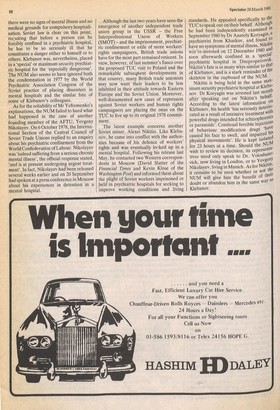Defending the Soviet worker
Bohdan Nahaylo
Earlier this month the International Labour Organisation rebuked the Soviet authorities for their treatment of independent trade unionists and workers' rights campaigners. It was, however, a tame rebuke, codling at the end of a two-year investigation which had highlighted serious violations of workers' rights, but had allowed Soviet officials to shrug off the evidence as malicious fabrications. By a curious coincidence, it seems likely that just at this moment British trade unionists, especially the National Union of Mineworkers, may be coming under pressure again to take up the cases of repressed 'free trade unionists' in the USSR. This issue was debated at the Trades Union Congress in Brighton in September 1978 soon after the emergence and suppresi son of the first independent Soviet trade union group known as the 'Association of Free Trade Unions of Workers in the USSR' (or AFTU). During the debate, Mr Frank Chap* angrily accused the TUC General Council of double standards because of its reluctance to condemn human rights violations in the Soviet Union. The outcome was a compromise motion which did not mention the USSR specifically, but affirmed the TUC's tommitment to support free trade unions 'anywhere in the world Without exception' and condemned the use of psychiatry as a means of repression. At around the same time British miners' leaders were faced with the case of Vladimir Klebanov, a former coal miner from the Ukraine and a leading spokesman for Soviet workers' rights campaigners. Klebanov had been at the forefront of a group of unemployed workers who, at the end of 1977, had announced the formation of the 200-strong AFTU because, as they claimed, the official Soviet unions `do not defend our rights and do not have the necessary authority'. All their attempts go get justice from the authorities' had failed and they had become representatives of `the great army of Soviet unemployed, thrown outside the factory gates for exercising our right of complaint, our right to criticise and our right to free speech'. In desperation, they had decided to organise their own 'genuinely independent trade union' so as go win the official and legal right to defend our interests — a right guaranteed by the Soviet Constitution — and to enlist in the common struggle for our rights other willing persons whose rights are unjustly violated'. Klebanov and his colleagues appealed for recognition and support to the ILO and to 'Trade Unions in the West'. 'We consider that only through a union of our own', they explained, 'basing itself on the public opinion of workers of all countries, can we force our government to respect the ordinary workers'. The Soviet authorities were quick to respond to this challenge. Within weeks of the formation of the AFTU, the unofficial group was broken up and several of its leading members, including Klebanov, forcibly confined in psychiatric hospitals.
The NUM national executive first discussed Klebanov's case in March 1978 and the mineworkers' leader, Mr Joe Gormley, then wrote to his Soviet counterpart, Yevgeny Yefremenko. The reply was received three months later and was made public during the Trades Union Congress in September. Mr Yefremenko, while not even mentioning Klebanov's arrest and confinement in a mental hospital, made him out to be simply a shirker and a troublemaker who was 'not in the least interested in getting a job'. He rejected the complaints of the unofficial workers' group, saying that the existing Soviet trade unions fully defended the rights and interests of their members. The numerous delegations of British miners that visited the USSR had been able go see it for themselves' and therefore there was no need to elaborate.
The NUM national executive was at first apparently divided on whether or not to accept the reply. But it finally decided to wash its hands of Klebanov following a meeting in Poland in November 1978 between a NUM delegation and the Soviet miners' leader. The British miners were told that Klebanov had started behaving strangely after suffering a head injury while at work in 1959. Mr Yefremenko is also reported to have besmirched the character of Klebanav, alleging for instance, that he had deserted his wife to live in Moscow with a younger woman. According to the Morn ing Star (16 December 1978), Mr Gormley subsequently told his colleagues that 'there was no reason to doubt' what Mr Yef remenko had told them. Following the acceptance of the Soviet explanation by the NUM national executive, Mr Gormley commented that although his union re mained committed to human rights throughout the world — the NUM had recently taken the Bolivian and Chilean governments to task over their treatment of workers — he did not think that it should continue 'to flog a dead horse on behalf of an individual'.
In arriving at its decision the NUM executive completely disregarded two im portant facts. Shortly before his arrest and detention in a mental hospital, Mr Klebanov had been independently examined by a Moscow psychiatrist, Dr Alexander Voloshanovich, who had concluded that there were no signs of mental illness and no medical grounds for compulsory hospitalisation. Soviet law is clear on this point, requiring that before a person can be forcibly confined in a psychiatric hospital, he has to be *so seriously ill that he constitutes a danger either to himself or to others. Klebanov was, nevertheless, placed in a 'special' or maximum security psychiatric hospital for the 'especially dangerous'. The NUM also seems to have ignored both the condemnation in 1977 by the World Psychiatric Association Congress of the Soviet practice of placing dissenters in mental hospitals and the similar fate of some of Klebanov's colleagues.
As for the reliability of Mr Yefremenko's explanations, the NUM failed to heed what had happened in the case of another founding member of the AFTU, Yevgeny Nikolayev. On 6 October 1978, the International Section of the Central Council of Soviet Trade Unions replied to an enquiry about his psychiatric confinement from the World Confederation of Labour. Nikolayev was 'indeed suffering from a serious chronic mental illness', the official response stated, 'and is at present undergoing urgent treatment'. In fact, Nikolayev had been released several weeks earlier and on 20 September had spoken at a press conference in Moscow about his experiences in detention in a mental hospital. Although the last two years have seen the emergence of another independent trade union group in the USSR — the Free Interprofessional Union of Workers (SMOT) — and the imprisonment, psychiatric confinement or exile of more workers' rights campaigners, British trade unions have for the most part remained reticent. In view, however, of last summer's fiasco over the proposed TUC visit to Poland and the remarkable subSeqtent developments in that country, many British trade unionists may now want their leaders to be less inhibited in their attitude towards Eastern Europe and the Soviet Union. Moreover, well-documented new cases of repression against Soviet workers and human rights campaigners are placing the onus on the TUC to live up to its original 1978 commitment.
The latest example concerns another Soviet miner, Alexei Nikitin. Like Klebanov, he came into conflict with the authorities because of his defence of workers' rights and was eventually locked up in a mental hospital. Following his release last May, he contacted two Western correspondents in Moscow (David Slatter of the Financial Times and Kevin Klose of the Washington Post) and informed them about the plight of Soviet workers imprisoned or held in psychiatric hospitals for seeking to improve working conditions and living standards. He appealed specifically to the TUC to speak out on their behalf. Althoue he had been independently examined in September 1980 by Dr Anatoly Koryagin, a psychiatrist from Kharkov, and found to have no symptoms of mental illness, Nikitin was re-arrested on 12 December 1980 and soon afterwards confined in a 'special psychiatric hospital in Dnepropetrovsk. Nikitin's fate is in many whys similar to that of Klebanov, and is a stark reminder of the skeleton in the cupboard of the NUM. Nikitin is being held in the same maximum security psychiatric hospital at Klebanov. Dr Koryagin was arrested last month after speaking out on Nikitin's behalf. According to the latest information on Klebanov, his health has seriously deteriorated as a result of intensive treatment with powerful drugs intended for schizophrenics or paranoids'. Continual forcible injections of behaviour modification drugs 'ha',e caused his face to swell, and impaired his physical movements'. He is kept isolated for 23 hours at a time. Should the NUM wish to review its decision, its representatives need only speak to Dr. Voloshanovich, now living in London, or to Yevge.hY Nikolayev, living in Munich. As for Nikinn, it remains to be seen whether or not the NUM will give him the benefit of their doubt or abandon him in the same way as Klebanov.











































 Previous page
Previous page